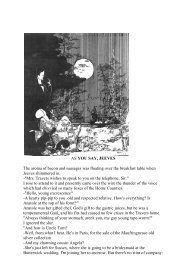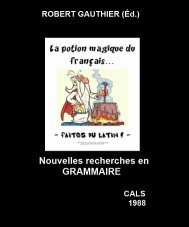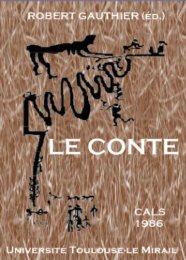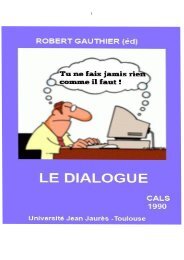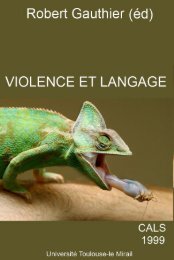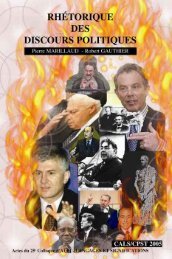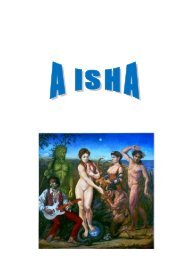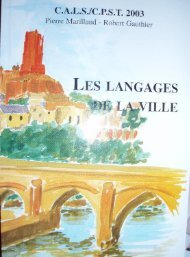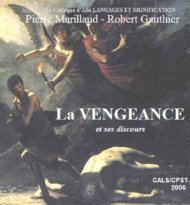- Page 2 and 3:
C A L S / C P S T - 2011 TRADUIRE
- Page 4 and 5:
COLLOQUES D'ALBI LANGAGES ET SIGNIF
- Page 6 and 7:
CHEN Yen-hsiu .....................
- Page 8 and 9:
PRÉSENTATION En traitant plus part
- Page 10 and 11:
PRÉSENTATION caractère civil gén
- Page 12 and 13:
PRÉSENTATION Le roman post-colonia
- Page 14 and 15:
PRÉSENTATION comme une forme de tr
- Page 16 and 17:
PRÉSENTATION Si les nombres sont c
- Page 18 and 19:
TRADUCTION(S), INTERPRÉTATION J'ai
- Page 20 and 21:
TRADUCTION(S), INTERPRÉTATION tran
- Page 22 and 23:
TRADUCTION(S), INTERPRÉTATION aux
- Page 24:
TRADUCTION(S), INTERPRÉTATION la t
- Page 27 and 28:
TRADUIRE… INTERPRÉTER d’énonc
- Page 29 and 30:
TRADUIRE… INTERPRÉTER des formes
- Page 31 and 32:
TRADUIRE… INTERPRÉTER corporelle
- Page 33 and 34:
TRADUIRE… INTERPRÉTER essentiell
- Page 35 and 36:
TRADUIRE… INTERPRÉTER concourt l
- Page 38 and 39:
PARAPHRASER, TRADUIRE LE TRAVAIL SU
- Page 40 and 41:
PARAPHRASER, TRADUIRE LE TRAVAIL SU
- Page 42 and 43:
PARAPHRASER, TRADUIRE LE TRAVAIL SU
- Page 44 and 45:
PARAPHRASER, TRADUIRE LE TRAVAIL SU
- Page 46 and 47:
PARAPHRASER, TRADUIRE LE TRAVAIL SU
- Page 48 and 49:
PARAPHRASER, TRADUIRE LE TRAVAIL SU
- Page 50 and 51:
PARAPHRASER, TRADUIRE LE TRAVAIL SU
- Page 52 and 53:
LA TRADUCTION : ENTRE FIDÉLITÉ ET
- Page 54 and 55:
LA TRADUCTION : ENTRE FIDÉLITÉ ET
- Page 56 and 57:
LA TRADUCTION : ENTRE FIDÉLITÉ ET
- Page 58 and 59:
LA TRADUCTION : ENTRE FIDÉLITÉ ET
- Page 60 and 61:
LA TRADUCTION : ENTRE FIDÉLITÉ ET
- Page 62 and 63:
LES DÉFICIENCES DU SYSTÈME OU DE
- Page 64 and 65:
LES DÉFICIENCES DU SYSTÈME OU DE
- Page 66 and 67:
LES DÉFICIENCES DU SYSTÈME OU DE
- Page 68 and 69:
LA PRAGMATIQUE DU TEXTE ÉROTIQUE L
- Page 70 and 71:
LA PRAGMATIQUE DU TEXTE ÉROTIQUE
- Page 72 and 73:
LA PRAGMATIQUE DU TEXTE ÉROTIQUE d
- Page 74 and 75:
LA PRAGMATIQUE DU TEXTE ÉROTIQUE
- Page 76 and 77:
LA PRAGMATIQUE DU TEXTE ÉROTIQUE h
- Page 78:
LA PRAGMATIQUE DU TEXTE ÉROTIQUE B
- Page 81 and 82:
TRADUIRE… INTERPRÉTER seulement
- Page 83 and 84:
TRADUIRE… INTERPRÉTER (Nestorix
- Page 85 and 86:
TRADUIRE… INTERPRÉTER pas trahir
- Page 87 and 88:
86 TRADUIRE… INTERPRÉTER L’all
- Page 89 and 90:
TRADUIRE… INTERPRÉTER barde/ et
- Page 91 and 92:
TRADUIRE… INTERPRÉTER sait qu’
- Page 93 and 94:
TRADUIRE… INTERPRÉTER - Et celle
- Page 95 and 96:
TRADUIRE… INTERPRÉTER Un tel tra
- Page 97 and 98:
TRADUIRE… INTERPRÉTER vite, cett
- Page 99 and 100:
TRADUIRE… INTERPRÉTER …но н
- Page 101 and 102:
TRADUIRE… INTERPRÉTER l’identi
- Page 103 and 104:
TRADUIRE… INTERPRÉTER ШУЙСК
- Page 105 and 106:
ГРИГОРIЙ про себя. В
- Page 107 and 108:
TRADUIRE… INTERPRÉTER veut pas d
- Page 109 and 110:
TRADUIRE… INTERPRÉTER QU’EST-C
- Page 111 and 112:
110 TRADUIRE… INTERPRÉTER délim
- Page 113 and 114:
TRADUIRE… INTERPRÉTER des droits
- Page 115 and 116:
TRADUIRE… INTERPRÉTER Dans les f
- Page 117 and 118: TRADUIRE… INTERPRÉTER JEANNERET
- Page 119 and 120: 118 TRADUIRE… INTERPRÉTER l’Un
- Page 121 and 122: TRADUIRE… INTERPRÉTER est l’ac
- Page 123 and 124: TRADUIRE… INTERPRÉTER réglement
- Page 126 and 127: INTERPRÉTATION DES CONCEPTS DANS L
- Page 128 and 129: INTERPRÉTATION DES CONCEPTS DANS L
- Page 130: INTERPRÉTATION DES CONCEPTS DANS L
- Page 133 and 134: TRADUIRE… INTERPRÉTER « d’app
- Page 135 and 136: TRADUIRE… INTERPRÉTER Aussi la m
- Page 137 and 138: TRADUIRE… INTERPRÉTER modifie en
- Page 139 and 140: TRADUIRE… INTERPRÉTER définit l
- Page 141 and 142: TRADUIRE… INTERPRÉTER enrichisse
- Page 143 and 144: TRADUIRE… INTERPRÉTER Je me limi
- Page 145 and 146: TRADUIRE… INTERPRÉTER possibles.
- Page 147 and 148: TRADUIRE… INTERPRÉTER TRADUCTION
- Page 149 and 150: 148 TRADUIRE… INTERPRÉTER tendan
- Page 152 and 153: INTRADUISIBILITÉ DE LA POÉSIE DE
- Page 154 and 155: INTRADUISIBILITÉ DE LA POÉSIE DE
- Page 156 and 157: INTRADUISIBILITÉ DE LA POÉSIE DE
- Page 158 and 159: ÉTUDE DU CHANGEMENT DE SIGNIFICATI
- Page 160 and 161: ÉTUDE DU CHANGEMENT DE SIGNIFICATI
- Page 162 and 163: ÉTUDE DU CHANGEMENT DE SIGNIFICATI
- Page 164 and 165: ETHICS OF POETRY IN TRANSLATION: ON
- Page 166 and 167: ON THREE ENGLISH VERSIONS OF GU CHE
- Page 170: ON THREE ENGLISH VERSIONS OF GU CHE
- Page 173 and 174: TRADUIRE… INTERPRÉTER Le sujet l
- Page 175 and 176: TRADUIRE… INTERPRÉTER Dans le pr
- Page 177 and 178: TRADUIRE… INTERPRÉTER L’ordre
- Page 180 and 181: MUSIQUE ET DISCOURS DANS LES QUATUO
- Page 182 and 183: MUSIQUE ET DISCOURS DANS LES QUATUO
- Page 184 and 185: MUSIQUE ET DISCOURS DANS LES QUATUO
- Page 186 and 187: VERS UNE CRITIQUE CRÉATRICE Je ne
- Page 188 and 189: VERS UNE CRITIQUE CRÉATRICE son as
- Page 190 and 191: VERS UNE CRITIQUE CRÉATRICE Loin d
- Page 192 and 193: VERS UNE CRITIQUE CRÉATRICE En eff
- Page 194: VERS UNE CRITIQUE CRÉATRICE Biblio
- Page 197 and 198: TRADUIRE… INTERPRÉTER cette noto
- Page 199 and 200: TRADUIRE… INTERPRÉTER mondial mo
- Page 201 and 202: TRADUIRE… INTERPRÉTER aucunement
- Page 203 and 204: TRADUIRE… INTERPRÉTER leur propr
- Page 205 and 206: TRADUIRE… INTERPRÉTER Bibliograp
- Page 207 and 208: TRADUIRE… INTERPRÉTER à cela ;
- Page 209 and 210: TRADUIRE… INTERPRÉTER traduction
- Page 211 and 212: TRADUIRE… INTERPRÉTER traduit, a
- Page 213 and 214: TRADUIRE… INTERPRÉTER Le roman d
- Page 215 and 216: TRADUIRE… INTERPRÉTER (15) Pars,
- Page 217 and 218: TRADUIRE… INTERPRÉTER attentes.
- Page 220 and 221:
L’AUTOBIOGRAPHIE LEIRISIENNE : UN
- Page 222 and 223:
L’AUTOBIOGRAPHIE LEIRISIENNE : UN
- Page 224 and 225:
L’AUTOBIOGRAPHIE LEIRISIENNE : UN
- Page 226:
L’AUTOBIOGRAPHIE LEIRISIENNE : UN
- Page 229 and 230:
TRADUIRE… INTERPRÉTER identifier
- Page 231 and 232:
TRADUIRE… INTERPRÉTER Il suffit
- Page 233 and 234:
TRADUIRE… INTERPRÉTER Ces deux t
- Page 236 and 237:
APPROCHE CONTRASTIVE DU TRADUCTEUR
- Page 238 and 239:
APPROCHE CONTRASTIVE DU TRADUCTEUR
- Page 240 and 241:
APPROCHE CONTRASTIVE DU TRADUCTEUR
- Page 242 and 243:
APPROCHE CONTRASTIVE DU TRADUCTEUR
- Page 244 and 245:
POURQUOI PLUSIEURS TRADUCTION D'UN
- Page 246 and 247:
POURQUOI PLUSIEURS TRADUCTION D'UN
- Page 248:
POURQUOI PLUSIEURS TRADUCTION D'UN
- Page 251 and 252:
TRADUIRE… INTERPRÉTER structures
- Page 253 and 254:
TRADUIRE… INTERPRÉTER de l’hom
- Page 255 and 256:
TRADUIRE… INTERPRÉTER conceptuel
- Page 257 and 258:
TRADUIRE… INTERPRÉTER de la comm
- Page 259 and 260:
TRADUIRE… INTERPRÉTER Dans le tr
- Page 261 and 262:
TRADUIRE… INTERPRÉTER J'ai montr
- Page 264 and 265:
LA PROSODIE COMME UN DES ÉLÉMENTS
- Page 266 and 267:
LA PROSODIE COMME UN DES ÉLÉMENTS
- Page 268 and 269:
LA PROSODIE COMME UN DES ÉLÉMENTS
- Page 270:
LA PROSODIE COMME UN DES ÉLÉMENTS
- Page 273 and 274:
TRADUIRE… INTERPRÉTER résultats
- Page 275 and 276:
TRADUIRE… INTERPRÉTER comme le c
- Page 278 and 279:
LA PARAPHRASE QUELLE RELATION ENTRE
- Page 280 and 281:
LA PARAPHRASE c’est cette notion
- Page 282:
LA PARAPHRASE I N S T Enfin, nous c
- Page 285 and 286:
TRADUIRE… INTERPRÉTER dans les r
- Page 287 and 288:
286 TRADUIRE… INTERPRÉTER - En r
- Page 289 and 290:
288 TRADUIRE… INTERPRÉTER La tra
- Page 291 and 292:
TRADUIRE… INTERPRÉTER compréhen
- Page 293 and 294:
292 TRADUIRE… INTERPRÉTER L'hypo
- Page 295 and 296:
294 TRADUIRE… INTERPRÉTER unité
- Page 297 and 298:
296 TRADUIRE… INTERPRÉTER métap
- Page 300 and 301:
LE TEXTE FILMIQUE TRADUIT POUR LE N
- Page 302 and 303:
LE TEXTE FILMIQUE TRADUIT POUR LE N
- Page 304 and 305:
LE TEXTE FILMIQUE TRADUIT POUR LE N
- Page 306 and 307:
LE TEXTE FILMIQUE TRADUIT POUR LE N
- Page 308 and 309:
LE TEXTE FILMIQUE TRADUIT POUR LE N
- Page 310 and 311:
LE TEXTE FILMIQUE TRADUIT POUR LE N
- Page 312 and 313:
LE TEXTE FILMIQUE TRADUIT POUR LE N
- Page 314 and 315:
L'INTERPRÉTATION SÉMIOTIQUE DU FI
- Page 316 and 317:
L'INTERPRÉTATION SÉMIOTIQUE DU FI
- Page 318 and 319:
L'INTERPRÉTATION SÉMIOTIQUE DU FI
- Page 320 and 321:
L'INTERPRÉTATION SÉMIOTIQUE DU FI
- Page 322:
L'INTERPRÉTATION SÉMIOTIQUE DU FI
- Page 325 and 326:
TRADUIRE… INTERPRÉTER intersémi
- Page 327 and 328:
TRADUIRE… INTERPRÉTER marbres do
- Page 329 and 330:
TRADUIRE… INTERPRÉTER Bien que l
- Page 331 and 332:
TRADUIRE… INTERPRÉTER « L’imp
- Page 333 and 334:
TRADUIRE… INTERPRÉTER La p. 24 (
- Page 335 and 336:
TRADUIRE… INTERPRÉTER « Où all
- Page 338 and 339:
AU SUJET DU ROMAN MÉMOIRE D'UN FOU
- Page 340 and 341:
AU SUJET DU ROMAN MÉMOIRE D'UN FOU
- Page 342 and 343:
AU SUJET DU ROMAN MÉMOIRE D'UN FOU
- Page 344 and 345:
AU SUJET DU ROMAN MÉMOIRE D'UN FOU
- Page 346:
AU SUJET DU ROMAN MÉMOIRE D'UN FOU
- Page 349 and 350:
TRADUIRE… INTERPRÉTER idéologiq
- Page 351 and 352:
TRADUIRE… INTERPRÉTER l’histoi
- Page 353 and 354:
TRADUIRE… INTERPRÉTER l'homme. A
- Page 355 and 356:
TRADUIRE… INTERPRÉTER illustrant
- Page 358 and 359:
LA COMPRÉHENSION COMME SAISIE DU S
- Page 360 and 361:
LA COMPRÉHENSION COMME SAISIE DU S
- Page 362 and 363:
LA COMPRÉHENSION COMME SAISIE DU S
- Page 364 and 365:
LA COMPRÉHENSION COMME SAISIE DU S
- Page 366:
LA COMPRÉHENSION COMME SAISIE DU S
- Page 369 and 370:
368 TRADUIRE… INTERPRÉTER Lorsqu
- Page 371 and 372:
TRADUIRE… INTERPRÉTER 1075. L’
- Page 374 and 375:
LES SIGNIFICATIONS MODALES ET PRAGM
- Page 376 and 377:
LES SIGNIFICATIONS MODALES ET PRAGM
- Page 378 and 379:
LES SIGNIFICATIONS MODALES ET PRAGM
- Page 380 and 381:
LES SIGNIFICATIONS MODALES ET PRAGM
- Page 382 and 383:
LES SIGNIFICATIONS MODALES ET PRAGM
- Page 384 and 385:
LES SIGNIFICATIONS MODALES ET PRAGM
- Page 386:
LES SIGNIFICATIONS MODALES ET PRAGM
- Page 389 and 390:
TRADUIRE… INTERPRÉTER la dévian
- Page 391 and 392:
TRADUIRE… INTERPRÉTER (6) La nui
- Page 393 and 394:
TRADUIRE… INTERPRÉTER métaphori
- Page 395 and 396:
TRADUIRE… INTERPRÉTER Les facteu
- Page 397 and 398:
TRADUIRE… INTERPRÉTER La publici
- Page 399 and 400:
TRADUIRE… INTERPRÉTER What a lon
- Page 402 and 403:
TRANSPOSITIONS IDENTITAIRES : LE CA
- Page 404 and 405:
TRANSPOSITIONS IDENTITAIRES : LE CA
- Page 406 and 407:
TRANSPOSITIONS IDENTITAIRES : LE CA
- Page 408 and 409:
TRANSPOSITIONS IDENTITAIRES : LE CA
- Page 410 and 411:
TRANSPOSITIONS IDENTITAIRES : LE CA
- Page 412 and 413:
TRANSPOSITIONS IDENTITAIRES : LE CA
- Page 414:
TRANSPOSITIONS IDENTITAIRES : LE CA
- Page 417 and 418:
TRADUIRE… INTERPRÉTER de montrer
- Page 419 and 420:
418 TRADUIRE… INTERPRÉTER (4) [1
- Page 421 and 422:
420 TRADUIRE… INTERPRÉTER Notons
- Page 423 and 424:
422 TRADUIRE… INTERPRÉTER très
- Page 425 and 426:
424 TRADUIRE… INTERPRÉTER [22:40
- Page 428 and 429:
LES OBJETS INSCRITS : QUELLES INTER
- Page 430 and 431:
LES OBJETS INSCRITS : QUELLES INTER
- Page 432 and 433:
LES OBJETS INSCRITS : QUELLES INTER
- Page 434 and 435:
LES OBJETS INSCRITS : QUELLES INTER
- Page 436 and 437:
LES OBJETS INSCRITS : QUELLES INTER
- Page 438 and 439:
LES OBJETS INSCRITS : QUELLES INTER
- Page 440 and 441:
INTERACTION ET CO-CONSTRUCTION DU S
- Page 442 and 443:
INTERACTION ET CO-CONSTRUCTION DU S
- Page 444 and 445:
INTERACTION ET CO-CONSTRUCTION DU S
- Page 446 and 447:
L’ÉCRITURE DU CORPS DANS LA TRIL
- Page 448 and 449:
L’ÉCRITURE DU CORPS DANS LA TRIL
- Page 450 and 451:
L’ÉCRITURE DU CORPS DANS LA TRIL
- Page 452:
L’ÉCRITURE DU CORPS DANS LA TRIL




